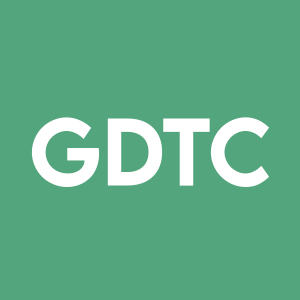CytoMed Therapeutics Acquires Cord Blood Banking Licence and Assets to Entrench Its Strategy in Allogeneic, Off-the-shelf Donor-derived Gamma Delta (γδ) T Cells Technology for Solid and Liquid Cancers
Rhea-AI Summary
CytoMed Therapeutics (NASDAQ: GDTC) has acquired a cord blood banking license and assets from Cellsafe International for approximately US$490,000. The acquisition includes cryopreservation equipment with over 12,000 cord blood units and two freehold properties. This move strengthens CytoMed's position in allogeneic gamma delta (γδ) T cell technology for cancer treatment.
Additionally, CytoMed has been granted a new patent in Malaysia for its iPSC-derived hybrid γδ NKT cells technology, expanding its tumor-targeting therapy patent portfolio. The company aims to develop cytotoxic γδ T cells from three sources: adult peripheral blood mononuclear cells, induced Pluripotent Stem Cells, and cord blood.
CytoMed plans to repurpose cord blood units for a wider range of therapies, including solid cancer treatment. The company is currently conducting the ANGELICA Trial, a phase 1 clinical trial in Singapore focused on CAR-T therapy.
Positive
- Acquisition of cord blood banking license and assets for US$490,000, strengthening position in γδ T cell technology
- New patent granted in Malaysia for iPSC-derived hybrid γδ NKT cells technology
- Expansion of tumor-targeting therapy patent portfolio
- Potential to repurpose cord blood units for wider range of therapies, including solid cancer treatment
- Ongoing phase 1 clinical trial (ANGELICA Trial) for CAR-T therapy in Singapore
Negative
- Financial impact of the acquisition not expected to be material
- Company not responsible for quality or viability of acquired cord blood units
- Interested party transaction with management investing in the venture requires disclosure and annual review
News Market Reaction
On the day this news was published, GDTC gained 14.29%, reflecting a significant positive market reaction.
Data tracked by StockTitan Argus on the day of publication.
Another Patent Granted for CytoMed's Allogeneic Induced Pluripotent Stem Cell (“iPSC”)-derived Hybrid Gamma Delta Natural Killer T (γδ NKT) cells technology
SINGAPORE, July 17, 2024 (GLOBE NEWSWIRE) -- CytoMed Therapeutics Limited (NASDAQ: GDTC) (“CytoMed” or “Company”), a Singapore-based biopharmaceutical company focused on harnessing its proprietary technologies to develop novel donor blood-derived, cell-based allogeneic therapies for the treatment of various cancers and aging-related diseases, has, through its wholly owned subsidiary, IPSC Depository Sdn Bhd acquired the licence and certain assets of Cellsafe International Sdn Bhd (In Liquidation) (“CISB”), a Malaysian cord blood bank for a cash consideration of approximately RM 2.3 million or US
The price consideration includes a cord blood banking licence issued by Malaysia’s Ministry of Health, cryopreservation equipment with more than 12,000 cord blood units (“CBUs”) and two freehold real estate properties totalling 189 square metres in which the operation is situated.
Unlike conventional alpha beta (αβ) T cells, γδ T cells are rare accounting for
CytoMed aims to be the pre-eminent biotech with capabilities to produce clinically relevant numbers of Good Manufacturing Practice (“GMP”)-grade γδ T cells from three key sources namely from adult peripheral blood mononuclear cells and from induced Pluripotent Stem Cells both of which we have significant experience, and soon, from cord blood. Once considered medical waste, cord blood has emerged as a valuable raw material with immense therapeutic potential in cell therapies. In recent years, researchers have made significant strides in harnessing the unique properties of cord blood derived cells for combating cancer and promoting healthy aging.
Traditionally, cord blood banks cryopreserve the CBUs with the purpose to use them for mainly blood disorders. However, cord blood banks are plagued by limited usage, currently only used for haematopoietic stem cell transplant for blood disorders and further restricted by conditions such as haplotype matching as well as inadequacy of cells. With the advancement and development of stem cell science and therapies, CytoMed intends to add significant value to CBUs customers by repurposing and expanding the use and application of such CBUs to a more extensive range of therapies including but not limited to the treatment of solid cancers.
Recent advances in cell science and technology have enabled researchers to produce specialized cellular therapies using mononuclear stem cells found in CBUs. Amongst these are the invaluable immune γδ T Cells, a rare subset of white blood cells which may be expanded from the CBU. Another cell type that is under investigation is cord blood derived Natural Killer (“NK”) cells which would be a cell of interest to be expanded from CBU. There are presently many ongoing international clinical trials using immune cells with abundant scientific papers published. γδ T Cells and engineered γδ T Cells i.e. chimeric antigen receptor T-cells (“CAR-T cells”) have garnered immense therapeutic interest in the treatment of a host of life-threatening diseases, in particular, solid cancers, which is CytoMed’s core focus. CytoMed has received approval for and is conducting the ANGELICA Trial, an on-going first in human phase 1 clinical trial in Singapore focused on CAR-T.
With exclusive licensed patents, knowledge and experience in the technology and engineering of γδ T Cells, CytoMed hopes to benefit the many CBUs stored all over the world by repurposing the cryopreserved assets and thus changing the basic business model of cord blood banking.
“This acquisition is to unlock the therapeutic potential of umbilical cord blood and adds strategic capital to our vision to develop cytotoxic γδ T cells for cancer treatment” said Peter Choo, Chairman of CytoMed “We aim to be the pre-eminent player in the γδ T cell technology with capabilities to produce highly viable γδ T cells from three key sources namely from adult peripheral blood mononuclear cells, from iPSC and soon, from the small amount of cord blood from the cryopreserved CBUs.”
Co-CEO Dr Tan Wee Kiat added “Mononuclear cells in the CBU are the starting raw material from which many cell therapies can be derived and it makes sense to focus on deriving immune T cells from them to fight both haematological and solid cancers especially in anticipation of future rapid development of this new medical science of cell therapy. We own our state-of-the-art cGMP lab to ensure quality and cost-control, and have patented technologies to actually manufacture clinical grade CAR-T cells as adjunctive therapies should the no-option patient’s doctor recommend it.”
The Company is only acquiring certain assets of CISB, free from encumbrances and will not be responsible for, amongst other things, the quality and/or viability of the CBUs or past liabilities. As such, the financial impact of the acquisition is not expected to be material. The Company intends to seek strategic partners in the future to jointly develop and grow this subsidiary as a specialised umbilical cord blood-derived immune cell bank offering cancer-fighting γδ T cells and NK cells.
The management of CytoMed has obtained board approval to jointly invest up to
New patent award
In another separate development, the Company is pleased to announce that the Intellectual Property Corporation of Malaysia has granted a patent for its licenced iPSC-derived hybrid γδ NKT cells technology, which targets solid and haematological cancers.
The patent titled "Methods and Kits for Generating Mimetic Innate Immune Cells from Pluripotent Stem Cells" with Grant No.MY-202222-A, covers the generation of iPSCs and differentiation into a hybrid γδ NKT cell without gene editing in the entire process, leaving the genome untouched. The generation of an iPSC line means that there would be infinite starting material, as well as a platform that would be open for gene editing if the need arises. The generation of a hybrid γδ NKT cells expressing receptors of both cell types on a single cell translates to enhanced recognition capabilities against cancer cells selectively while sparing healthy cells. This enables the differentiated cell type to recognise and target a wide range of cancers, including both solid and haematological cancers. The Company holds an exclusive worldwide license to use this patent pursuant to the License Agreement dated June 1, 2018, filed with the Securities and Exchange Commission as an exhibit to the registration statement on Form F-1 (File No.: 333-268456) on March 30, 2023.
This grant adds to the breadth of our tumor-targeting therapy patent portfolio, alongside a Japanese and China patent in respect of this iPSC-derived hybrid γδ NKT cell technology. This patent grant is timely as Malaysia is attracting more biomedical innovators amidst an ageing population and reputation as a medical tourism hub. CytoMed’s IPSC- γδ NKT cell program is under active GMP development and will be commencing animal studies as the next milestone.
About CytoMed Therapeutics Limited (CytoMed)
Incorporated in 2018, CytoMed was spun off from the Agency for Science, Technology and Research (A*STAR), Singapore’s leading research and development agency in the public sector. It is a biopharmaceutical company focused on harnessing its licensed proprietary technologies, namely gamma delta T cell and iPSC-derived gamma delta Natural Killer T cell, to create novel cell-based allogeneic immunotherapies for the treatment of various human cancers. The development of novel technologies has been inspired by the clinical success of existing CAR-T therapies in treating haematological malignancies, as well as the current clinical limitations and commercial challenges in extrapolating the CAR-T principle into the treatment of solid tumours. For more information, please visit www.cytomed.sg and follow us on Twitter (“X”) @CytomedSG, on LinkedIn, and Facebook
Forward-Looking Statements
This press release contains forward-looking statements as defined by the Private Securities Litigation Reform Act of 1995. Forward-looking statements include statements concerning plans, objectives, goals, strategies, future events or performance, and underlying assumptions and other statements that are other than statements of historical facts. When the Company uses words such as "may, "will, "intend," "should," "believe," "expect," "anticipate," "project," "estimate" or similar expressions that do not relate solely to historical matters, it is making forward-looking statements. Forward-looking statements are not guarantees of future performance and involve risks and uncertainties that may cause the actual results to differ materially from the Company's expectations discussed in the forward-looking statements. These statements are subject to uncertainties and risks including, but not limited to, the following: the Company's plans to develop and commercialize its product candidates; the initiation, timing, progress and results of the Company's current and future pre-clinical studies and clinical trials and the Company's R&D programs; the Company's expectations regarding the impact of future COVID-19 outbreak on its business, the Company's industry and the economy; the Company's estimates regarding expenses, future revenue, capital requirements and needs for additional financing; the Company's ability to successfully acquire or obtain licenses for additional product candidates on reasonable terms; the Company's ability to establish and maintain collaborations and/or obtain additional funding and assumptions underlying or related to any of the foregoing and other risks contained in reports filed by the Company with the SEC. For these reasons, among others, investors are cautioned not to place undue reliance upon any forward-looking statements in this press release. Additional factors are discussed in the Company's filings with the SEC, which are available for review at www.sec.gov. The Company undertakes no obligation to publicly revise these forward–looking statements to reflect events or circumstances that arise after the date hereof.
Contact :
CytoMed Therapeutics Limited
enquiry@cytomed.sg
Attention : Evelyn Tan, Chief Corporate Officer






